
The Britpop band frontman turned solo singer-songwriter reveals a penchant for cryptic crosswords and an unremitting struggle with song titles
Rewind 18 years, to the height of Britpop, and you would’ve found an iconic album titled (What’s the Story) Morning Glory? by Oasis at No.1 in the UK album charts for a 6th week in a row. But a week later, in February 1996, a little-known indie band called The Bluetones managed to knock the Gallaghers off the top spot with their debut album, Expecting To Fly.
At the front of this new guitar band from Hounslow was a singer called Mark Morriss, whose distinctive voice, articulate lyrics, obtuse song titles and a curious ‘shimmying’ stage-presence, captured the attention and the imagination of the record-buying public. But, where many of their British indie contemporaries became one-hit wonders and failed to sustain their commercial success, The Bluetones followed their platinum-selling debut with two more Top 10 albums and a clutch of Top 40 singles over the subsequent seven years.
The band officially called it a day in 2011, but Morriss stepped out as a solo singer-songwriter with the folk-infused debut Memory Muscle in 2008, and now he returns with a more confident sophomore long-player in the shape of A Flash Of Darkness.
We take the opportunity to reflect with Mark on his roller-coaster journey through the past two decades in music, how those hits were written, and where he finds inspiration and how he comes up with offbeat song titles…
How did The Bluetones come together?
“I guess the story starts with the moment I joined a band that only had two other members; a guitarist and a singer. I came in as bass player and brought a drummer with me, but it became clear that the existing guitarist was even worse than I was! So it made no sense for me to stay on the bass. My brother Scott and I shared a bedroom so I’d leave guitars lying around and he’d pick them up when I wasn’t there and he learnt how to play. He came to rehearsals just out of curiosity and was only meant to stand in on bass until we got a ‘proper’ bass player, but after about three rehearsals it was apparent Scott was the best musician in the room! A bit later Adam [Devlin, the lead guitarist] joined and we became The Bluetones.”
[cc_blockquote_right] AS SOON AS YOU LEARN THREE CHORDS, YOU START WRITING TUNES TO GO WITH THE POETRY YOU’D BEEN SCRIBBLING [/cc_blockquote_right]
How did you get into music? Did you and Scott grow up in a musical family?
“There wasn’t much musical influence at home and there weren’t many albums around in the house. My mum had about eight records – one of which was War Of The Worlds, six were by Elton John, and one was a Treasure Island spoken word story. It came from school really – I was lucky that it had a big music department, so on rainy lunchtimes I’d hang around there and eventually I picked up a guitar. At that age, as soon as you learn three chords, you start writing tunes to go with the poetry you’d been scribbling down.”
What bands were you into back then?
“It would’ve been the late 80s early 90s so it was the ‘Madchester’ scene so I was listening to bands like the Stone Roses, which led me on to things like The Byrds, Jimi Hendrix and a lot of the West Coast psychedelic records that would’ve passed me well by. We listened to a lot of indie at the time, like the Honey Smugglers. There were a lot of bands who seemed to make one album and disappeared. I worked in a record shop so I’d hear everything that came out. I was listening to bands like Love and The Beatles, and artists like Neil Young and Scott Walker, and that was what was shaping my early songwriting.”
Do those bands still influence you today?
“I think they do, yeah. Certainly Love and Buffalo Springfield, their sense of melody and unpredictability that they had. They were essentially pop compositions, but they’re slightly different. That’s what I love to do: I write pop songs – they’re usually about four minutes long at most. That’s what I’m most skilled in, and it’s what I get the most satisfaction from.”
All your songs are largely credited to The Bluetones, rather than you or an individual member of the band. How did you approach writing as a band? Was it a democratic process?
“Adam and I were the main songwriters in the band, but we shared a house, so we would all sit in the living room strumming. Someone would come up with a germ of an idea and we’d all take it and run with it, and express ourselves on it. It was generally left to me to come up with lyrics – someone would record a tune into a tape player and I’d take the cassette for a few days and come back with a tune and some words. It was really that simple. Then we’d get together and see if it all fitted.”
Did you jam and write music with any concept or title in mind first?
“No, not really. Titles I’d always find hardest to come up with, which is why some of them are quite obtuse. Even with Slight Return isn’t a line from the song – it’s just a nickname that stuck. That happened a lot of the time.”
That’s funny, because a lot of your song titles were great. Solomon Bites The Worm and Cut Some Rug really stood out at the time.
“Oh cheers! Well, I struggle with titles, I really do. There was a song called Sleezy Bed Track on our second album, which was just the title while it was an instrumental, because that was the vibe of it, and it stuck. Although it did lead to the theme of the song in terms of its lyric.
“There are so many different ways that you can conjure a song out of the air. If I’ve been conscious of anything throughout my career as a writer, it’s not sticking to a formula. I know I write pop songs, but still within that framework there are so many possibilities. It feels like you’ve got to keep searching in the air for this idea that’s floating out there.
“Being in a band, there was always that added ‘x factor’ that someone else would come in with a new idea, that’s not necessarily something you would’ve thought of. Whereas, now I write the songs to pretty much the same stage – simple chords, a beginning, middle and end – and now there’s no-one else to jump in and say why don’t you shorten the beginning or why don’t you extend the end, or whatever.
“Now I work in a similar way, in that I get the songs demoed to pretty much the same degree as I did in the old days. But then I just forget about them for a while, then I come back to them sometime later with slightly fresher ears. That’s the only process I’ve got: write things down quickly, record them in some rudimentary fashion and then explore them later on when I’ve forgotten about them.
“This probably feels like a bit of a weak analogy, but I like to do cryptic crosswords and there’s a certain way of cracking them, that sometimes entails patience. I could sit there all morning staring at it, whereas if I fold it up and come back to it a couple of hours later, it all falls into place. It’s a similar approach with songwriting – forget about it, put it out of your head, and the next time you come to listen to it you’ll have a different perspective.”

What sort of timeframe would you typically put a song ‘down’ for? Days, weeks, months…?
“It’s usually a few weeks. I’ll try to play it on the guitar and inevitably I’ll have forgotten some of the chord progressions, so I’ll refer to the demo and that’ll start the wheels turning again.”
Do you miss collaborating with a band, or do you prefer writing on your own and having no-one else interfering?
“I really enjoyed the dynamic of collaborating with my band members, but at the same time I don’t feel I could just walk into a room with a load of other musicians and be confident to write songs with other people. I think I’d have to get to know someone first. I think it’s just my personality – it’s a fear of being exposed.”
Would you call yourself a spontaneous writer or are you a re-writer that likes to pore over every note and word?
“I would say both. Sometimes I’ve written songs that have popped out fully formed. On the new album there’s a song called This Is The Lie (That Is The Truth) that lasts for about two minutes and 24 seconds, but it took about half that time to write it! It just came out. I knew as I was playing it that I wanted to keep it simple – to have six or seven lines that repeat where each time there’s a different inflection on it. Hopefully it makes the listener realise that the singer is contemplating what they’re saying, that there’s regret.”
[cc_blockquote_right] CERTAIN VOWEL SOUNDS AND CONSONANT SOUNDS ARE MUSICAL, SO YOU CAN PICK THE RIGHT ONES TO USE IN THE RIGHT PLACE [/cc_blockquote_right]
How about the song Consuela, was that one that came out of nowhere?
“At that time I wasn’t thinking about writing for an album; I was just writing songs and I was thinking I hadn’t written a ‘name’ song, like Mandy. So I went on the internet to look at popular names, and then it occurred to me that I could write about a name that’s rare. Consuela sprang to mind and I’ve always liked that name.
“Ironically, I was trying to write something that sounded like The Ramones, but when I got into the studio it completely changed and went a bit latino. That was another one that took a while – the music and the melody came quickly, but the had to keep coming back to the lyric. I’d set time aside each evening to get my notebook out and have another think about it. Another element I’ve always thought of, as a lyric-writer, is the sound of the words, as well as the meaning. It’s different from poetry because these words are sung, and not spoken. So certain vowel sounds and consonant sounds are musical, so you can pick the right ones to use in the right place. I had the melody for Consuela, but it opens up with all the vowels, and allows the melody to rise. These are the things I’m conscious of and the details that I like to pore over.”
Do you notice that when you look back at the song, retrospectively, or do you analyse each line scientifically in that way?
“What I think I do is hammer it into shape. I start by writing a sense of what I want to say, or the character that I want the song to have. Then I’ll change words, shorten lines and shift bits around so the rhythm of the line is different, until I’m happy with it.”
Thinking back to when you were writing the songs that ended up on Expecting To Fly, did you have any idea it would be as successful as it became?
“No we didn’t at all. We were confident that we’d find ourselves audience. We just hoped we’d be a cult band – that would’ve been enough for us! When Slight Return went so big and the album followed it didn’t feel real.”
When you went on to write the ‘difficult second album’, there must’ve been a lot of pressure and expectation. Did you find yourself writing on the road, to keep the momentum going?
“We didn’t really have much chance to write on the road. To tell you the truth, I think we could’ve done with feeling the pressure a little bit more! I think we were too relaxed and the album itself is too long. We’d toured constantly with Expecting To Fly and we were exhausted. We didn’t have a chance to take a break, so we were a little bit burnt out. We hadn’t got acclimatised to that cycle of create-tour-create-tour…”
Interview: Aaron Slater



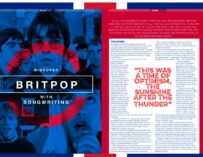

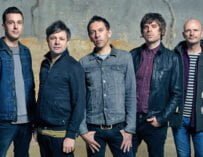
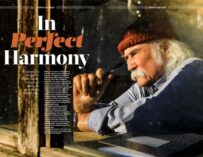

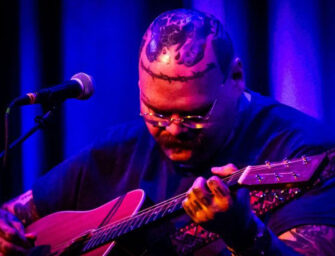
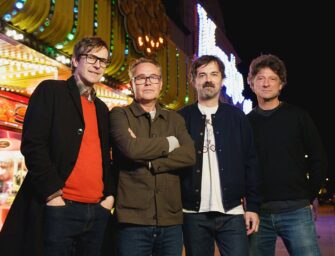

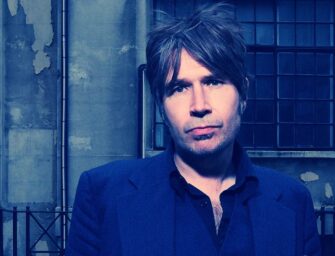























Related Articles